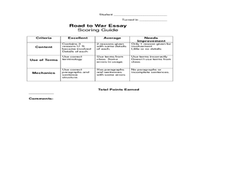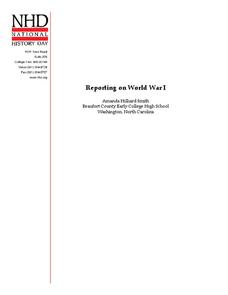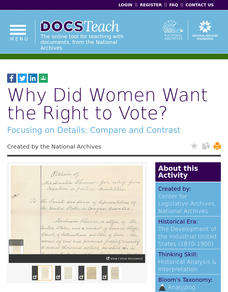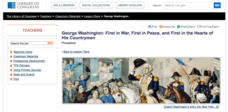Curated OER
Lesson 6: Native Americans in the West
Learners recall their knowledge of Native American people who lived in the West and reflect on how their perspectives differed from pioneers and argonauts of the 19th century.
Curated OER
Social Studies: How Did Native Americans Live?
Fifth graders examine Edward Curtis' photographs and Robert Griffing's paintings to analyze Native American culture. They present research information on specific tribes, using the photos and paintings to uncover information about the...
Curated OER
Who's Who In Black History
Fourth graders examine the life and achievements of promident African-Americans. As a class, they participate in acting out various scenes of a play which represents the Civil Rights era. They discuss how the world might be different...
Curated OER
A Lesson To Accompany "The First Bank of the United States: A Chapter in the History of Central Banking"
Here is an interesting topic. Learners examine the economics that led to the founding of the First Bank of America. They participate in a reader's theater experience depicting the debate between Alexander Hamilton and Thomas Jefferson...
Curated OER
Early U. S. Involvement in World War II
Ninth graders examine how the U. S. was aided by the Allies in World War II before the U. S. declared war. They analyze the evolution of U. S. foreign policy from the beginning of WW II through U. S. Declaration of War
Curated OER
Jazz Exploration: A Collage Project
Middle schoolers explore and experience jazz through collage. They listen to improvisational jazz, discuss the origins of jazz, then design and create a collage that shows jazz being played. This project will result in amazing works of...
Institut Obert de Catalunya
20th Century Music: Jazz
A 67-page packet provides instructors with a complete course in the history of Jazz. Lessons look at the roots of jazz in early 20th century African American communities in the southern United States and continues to the New Orleans...
Constitutional Rights Foundation
Ellis Island—The “Golden Door” to America
Are you one of the 100 million Americans whose ancestors passed through the doors of Ellis Island? Learn about the historic entry point for immigrants in the late 19th and early 20th centuries with an informative reading passage. After...
National History Day
Reporting on World War I
Throughout history, newspapers have reported the events of the day as they unfolded. Using primary and secondary sources from World War I, scholars uncover how the American people learned of the events of the War to End All Wars. History...
John F. Kennedy Presidential Library & Museum
Military Advisers in Vietnam: 1963
How did the beginning of the Vietnam War factor into the Cold War with the Soviet Union? As part of a study of American involvement in Vietnam, class members read a letter address to President Kennedy and his response in which he...
NPR
Suffrage Lesson Plan
Has life changed for American women in the last century, or are there common themes between the lives of 21st century women and the struggle of suffragettes from the 1910s? Explore the ways media reflects the position of women in the...
PBS
Lessons in Leadership, Roosevelt Style
It's easy to criticize those in power until you're sitting at their desk, faced with the same decisions. A history lesson plan prompts secondary learners to research the Roosevelt presidencies through the lens of leadership and...
American Museum of Natural History
Talk to a Titanosaur
Learn all about the Titanosaur with an engaging website that delves deep into the large reptile's physical traits, family history, discovery, and fossil reconstruction.
National Constitution Center
Abraham Lincoln's Crossroads
History enthusiasts participate in an interactive website that brings Abraham Lincoln to life as he shares his personal experiences between 1854-1864. Scholars listen and read carefully to form their own opinions and discover if they...
DocsTeach
Why Did Women Want the Right to Vote?
No taxation without representation may have been the battle cry of the American Revolution, but women used the same argument when demanding their right to vote in the late 1800 and early 1900s. Young historians examine petitions from...
Library of Congress
George Washington: First in War, First in Peace, and First in the Hearts of His Countrymen
Does the lens of history portray George Washington as a good leader? A three-lesson unit looks at Washington's early military career as the commander of the Virginia Regiment, his role in the fight for independence from England, and his...
Digital History
The Slave Trade
When studying the slave trade in early American and world history, use this document to expose your learners to the abhorrent conditions that existed on slave ships. Read through two first-person accounts of the enslavement process,...
Curated OER
The Early Development of Korea
Students examine the early development of the country of Korea. Using maps, they identify how geography of the country has contributed to its isolation. They use the internet to research how China influenced Korea and what achievements...
Curated OER
Now's the Time to Learn About the Ancient Greek Olympics
You can take advantage of the history of the Olympic Games to teach about the contributions of the Ancient Greeks.
Curated OER
Colonial Living: A Look at the Arts, Crafts, History, and Literature of Early Americans
Sixth graders examine the different aspects of life in Colonial America. At home, they make traditional colonial recipes to share with the class. In groups, they read a book about the purpose and act of quilting and create their own...
Curated OER
The Jeffersonian Age: 1800 - 1824 (5)
In this online interactive American history worksheet, students answer 15 fill in the blank questions regarding the Jeffersonian Age. Students may submit their answers to be scored.
Curated OER
Head, Heart, Hands, Health
Fourth graders complete a compare and contrast activity for American agriculture historical events. In this historical events in agriculture lesson, 4th graders review a timeline and complete research for agriculture in the 20th century,...
Curated OER
Hindsight is 20-20Presidential First 100 DaysPresentation
Students interpret historical evidence presented in primary and secondary resources. For this American history lesson, students research the first 100 days of several American Presidents. Students use their research findings...
Curated OER
Weaving Project
Students practice artistic weaving. In this Colonial arts lesson, students weave pieces using lint from their home dryers. Students replicate the weaving process early Americans used. Students are also challenged to weave using the extra...

























